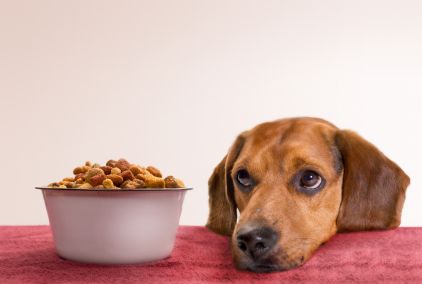Are You Feeding Your Dog the Right Amount of Food?
One of the best ways to keep dogs healthy is to feed them the right amount of food. Too little and a dog can suffer from nutritional deficiencies. Too much eventually results in obesity and all of the health problems related to that condition including:
- Musculoskeletal problems like osteoarthritis, cruciate ligament ruptures, and intervertebral disk disease
- Congestive heart failure
- Cushing’s disease
- Skin disorders
- Some types of cancer
To start the process, take a look at the feeding guide on your dog food’s label. They are usually presented as a table that looks something like this:
Unless stated otherwise, these amounts are the total that is recommended for your dog over a 24 hour period. Most adult dogs should eat two meals a day (puppies often require three or more feedings), so you’ll need to divide the amount in the table by the number of meals you are offering.

Combine this information with your knowledge of your dog’s lifestyle to come up with the initial amount of food you are going to offer your dog. If I had a relatively inactive 35 pound Corgi who had a tendency to gain weight, I might start with 2 cups of food per day. On the other hand, if my dog was a hyper 35 pound Border Collie, I would feed a little more.
Next, use a scale or body condition scoring system to fine-tune the amount you are offering. Check your dog every 2-4 weeks and keep a diary of your results. If your dog is inappropriately gaining or losing weight/body fat, adjust your portion sizes appropriately. In general, dogs who are at a healthy weight:
- Have an “hourglass” figure when looked down upon from above. The abdomen should be narrower than the chest and hips.
- Are “tucked up” when looked at from the side. This means that a dog’s chest is closer to the ground than his belly when he is standing.
- Have ribs that are not readily visible but are easily felt with only light pressure.

Talk to your veterinarian if you have any questions about your dog’s health or diet. The doctor can help you determine exactly how much your dog should be eating based on the specifics of the case.

Dr. Jennifer Coates




Comments
Post a Comment